
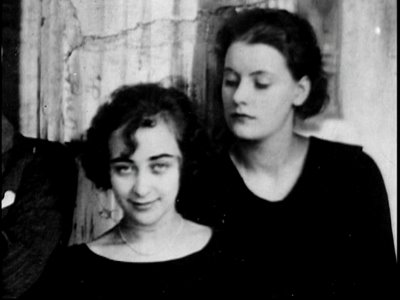
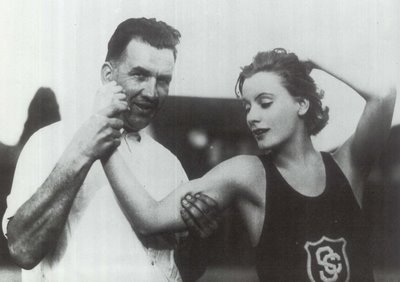 Monday Glamour Starter --- Greta Garbo --- Part One
Monday Glamour Starter --- Greta Garbo --- Part OneMen have a hard time getting what the Garbo excitement is/was about. She is not for the uninitiated, and even seasoned buffs have a tendency to leave her off their viewing menu. The centennial celebration(s) of 2005 were welcome to those who cared, but I wondered then how so many book and DVD tributes would fare after those hundred years had passed. For a lot of people, Garbo’s cold as ice, and that’s all there is to her. Much as I like watching the films, I never once envied those screen partners that bedded her. Maybe it’s me, but it never seemed Garbo had an ounce of sex in her, and that’s a legitimate issue when addressing a presumed goddess of love, even if it’s mostly of the unattainable variety. Her unique sensibility was what mattered in the long run, for willing love goddesses were, after all, more easily manufactured. Much of Garbo's persona derived from a European outlook, I suppose, but she conveyed a knowing quality to parts American actresses would have bought into and played straight. She floated somewhere above hackneyed material she recognized for what it was. Sometimes her expression betrayed the boredom and frustration of it all, and you wondered when she’d break through the fourth wall, walk past all of us, and head back home to Sweden. Garbo seemed to traffic in emotions unknown to performing rivals, and yet audiences spotted truth in her work and identified with her responses. That was then, before she ditched celebrity and became a dedicated recluse. There’s still resentment over that frigid resolve and I Want To Be Alone hauteur --- Fine, we never thought you were that great to begin with! To love Garbo is to assume the role of so many hapless men (and women) in her movies, for she’ll never give anything back. The prospect of such unrequited love, particularly when it’s directed toward a public figure (an entertainer yet!) who by any definition of the term should be more generous, is an irritating and off-putting thing. If she’d just once been nice to an interviewer, confessed perhaps upon her eightieth birthday that the whole image had been contrived (and there’s reason to believe it was, largely by Garbo herself), maybe a lot more of us could embrace her today. I like to imagine a forgotten kinescope hidden somewhere at NBC of Dave Garroway and simian sidekick J. Fred Muggs interviewing the elusive Miss Garbo on a 1955 Today segment flanked by Ovalteen commercials and a singing appearance by Johnny Ray. Wouldn’t it be neat if such a thing turned up on YouTube?
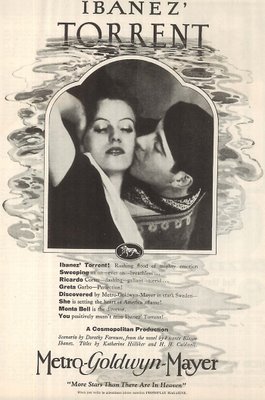
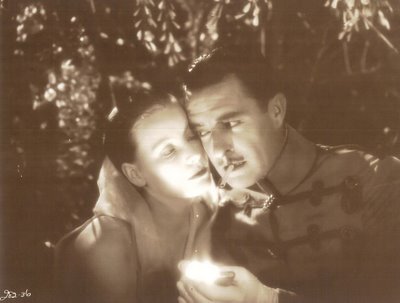
Should the foregoing seem irreverent, let me hasten to add I think Garbo’s terrific. Seven of her pictures have passed my way these last days and I've not yet tired of her, so don’t let’s confuse me with revisionist voices seeking to dismantle the myth. On the other hand, I’m not of the worshipful school of older critics who built and maintained a shrine that remained intact for all of Garbo’s lifetime, and has only lately been challenged by a new generation of critics coming to her by way of DVD reviews both online and in hep publications like Entertainment Weekly and Premiere. Sometimes I’m shocked at the dismissive ways of modern media when they tear down sacred totems, and someone like Garbo makes a ripe target for non-believers who failed to get the memo about her greatness. Our Web world has unleashed radical voices to take on the critical orthodoxy where Garbo and a lot of others are concerned. There’s quite a gulf between books I’ve read by Andrew Sarris or Alexander Walker and online reevaluations by cheeky youngsters determined to swing the bat on established idols like so many Piñatas. Never have old stars been so fragile as they are today. What’s special about him/her? Were Garbo alive, she might be alarmed by such shifting tides. She’d at least be aware of it, in any case, as I understand there was a clipping service on retainer throughout her life, and during stardom days secretaries were routinely dispatched to go out and buy fan magazines (but only ones that featured her). Wasn’t that Garbo herself that stole into Museum Of Modern Art revivals during the fifties and sixties? They say it was, and apparently she did. Hey, I’ve gone in and polished/revised old Greenbriar articles from months ago. Why shouldn’t Garbo have an occasional glance backward, even though she professed not to care?
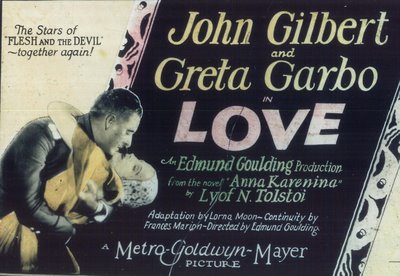
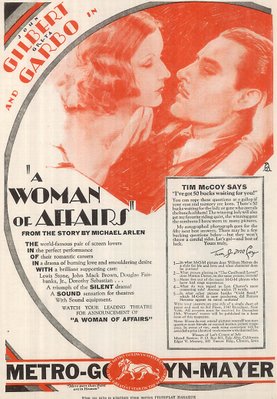
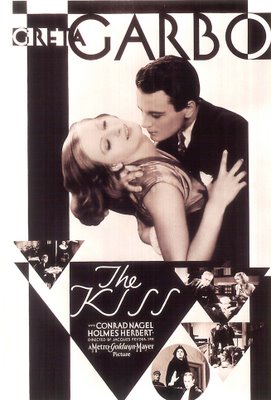
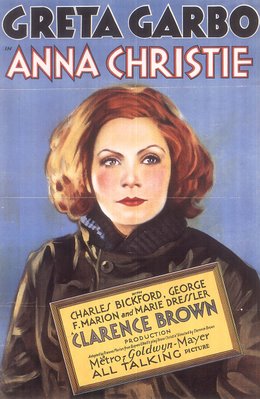
Withdrawn Swedish temperament did not lend itself well to playing with others, particularly on movie sets. You can blow off the press in that business, but it’s unwise being rude to people sharing your monotony on a sound stage. Was it deprived upbringing and unpolished manners that caused Garbo to treat Marion Davies so badly during the latter’s attempt at a friendly on-set visit? Basil Rathbone and Freddie Bartolomew both requested signed portraits at the end of Anna Karenina and were summarily rebuffed. Rathbone remained miffed twenty-five years later penning his memoirs. Movie folk were unaccustomed to snubs like these. It’s one thing to chase off autograph hounds outside the gates, but Garbo made colleagues feel like intruders upon her privacy, and this was not an attitude to foster good will. Had she not been so wildly successful with audiences, I’ve no doubt they’d have relished giving her the pink slip. We’ve all had encounters with the socially challenged, but imagine the frustration of dealing with one who always got to be right. The bigger she grew, the higher she erected those walls. It got to a point where other actors weren’t even permitted to watch her emote, such was Garbo’s determination to keep things private between herself and the camera. All this eccentricity was bred by success, for at the beginning, she’d been reasonably affable and ambitious as the rest, but much of that team spirit was left behind in Sweden, where hard times made her thankful for work in advertising reels and modest features. She’d gotten into drama academy despite humble beginnings, only to become hopelessly smitten with classmate Mimi Pollak (shown with her here). Recently revealed letters track Garbo’s devotion through a lifetime of unrequited (there’s that word again!) passion, but by the looks of pixie Mimi, who could blame her? These lakeside swimsuit antics were shared with two other ingenues, both with seemingly better prospects than a plumpish Garbo, her Wal-Mart shopper heft soon giving way to a studio-mandated all-spinach diet, presumably Sweden’s own draconian Atkin’s substitute. Luck was with her when director Mauritz Stiller offered The Saga Of Gosta Berling, far and away the biggest undertaking yet attempted by a Nordic filmmaker, and one noted by a visiting Louis B. Mayer, whose interest in Stiller was now sidetracked by a fascination with Garbo. Both artists would decamp to America, providing the finishing touch to a Swedish industry already deprived of its other distinguished director, Victor Sjostrom (by way of his own Metro contract). Stiller the mentor and master would come to know that in Hollywood, survival was for the fittest, as would his pupil, though Garbo, whose good luck was, and would remain, unswerving, flourished even as his floundered.

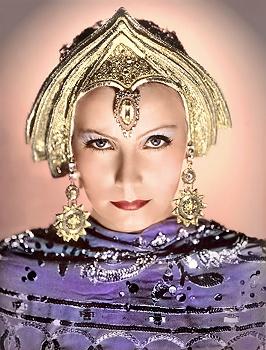
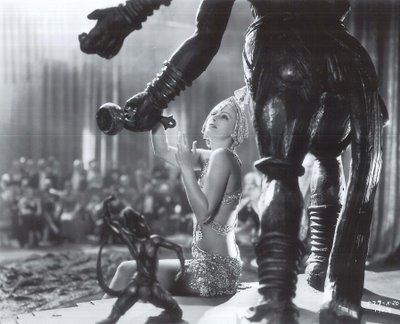
If MGM had a model for developing Garbo, it would likely have been Paramount’s Pola Negri, a German import whose line in Euro-sophistication awakened passions dormant in stateside audiences and gave us all a taste for Continental variations in lovemaking. It was only natural that Garbo be herded in the same direction. Otherwise, why bring her over? We’ve largely forgotten Negri, thanks to films mostly lost, but it’s unlikely she got vehicles so lush as The Torrent and The Temptress, Garbo’s first and second, both based on Blasco Ibanez novels, both showcases for the new star. Any $400 a week player would have died for a start so auspicious, but Garbo complained and made waves from Day One, hating what she referred to as vamp roles and vowing to pack for home unless things improved. Sympathetic Lon Chaney advised her to keep them guessing. Be mysterious and secretive. The conscious decision to do just that defined the remainder of her career, as well as offscreen life. The purposeful withdrawal saved her the embarrassment of dealing with a corporate and social structure she couldn’t begin to understand; silence too deflected awareness of language skills she lacked. What choice but to become The Swedish Sphinx when you’re obliged to drag an interpreter (and hers was doubling as a Mayer snitch!) everywhere you go? From such sour fruit came ambrosia, for Garbo’s pained ambivalence struck a chord with her public and gave them something brand new --- a reluctant movie star. MGM went public with contract disputes, as this played hat and glove with the image they’d fostered. Flesh and The Devil profited from that investment in publicity, for the on and offscreen coupling of Garbo with (much bigger) co-star John Gilbert turned the ignition on a boxoffice clean-up that made these two the screen’s most believable love team. Rival pairings of a Colman/Banky, Gaynor/Farrell sort were persuasive enough as make-believe love matches went, but none generated the heat of a Gilbert/Garbo embrace, its carnality given further emphasis by the leading lady’s fervent way with a kiss (open-mouthed and/or on top of Gilbert). As to standards of further Garbo silents, they remained high, and ever increasing grosses rewarded Metro’s efforts. Love, The Mysterious Lady, and A Woman Of Affairs still play nicely today, and The Single Standard, Wild Orchids, and The Kiss each benefited from recorded music-and-effects during those waning days before talkies. As to these, Garbo must have worn the rabbit’s foot Vilma Banky and Emil Jannings lost, for she was about the only notable foreign-born survivor of the sound purge to come. More about that in Part Two to follow.